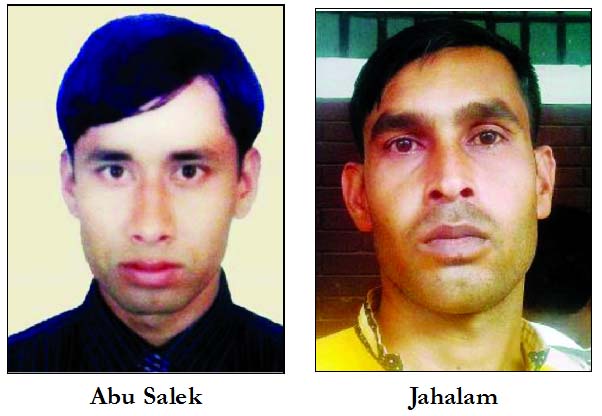
Although Jahalam won back his freedom this week following an intervention by the High Court, the miscarriage of justice in the case does not end only with the three years of his life, that too in its prime, that no power on earth can give back to him.
In the time that Alam spent behind bars, arrested in connection with 26 cases that were filed against him wrongfully, Abu Salek, the fraudster who managed to pull the wool over the investigating agencies’ eyes simply by substituting Alam’s address in place of his on documents used in the execution of his fraudulent activities – notably a loan of Taka 18 crore from Sonali Bank that was never paid back.
Word is he has long crossed the border and now remains beyond the reach of our law enforcers in India.
Following up on an address in Thakurgaon district was always destined to end in futility, although it did yield some insight into the crooked path he followed, even as outwardly he worked as a data entry staff at the National Identity Card Registration Wing of the Election Commission.
The palatial residence, certainly in comparison to its rustic surroundings, is not only an eyesore jarring with its village setting, we soon learn it has also been more or less deserted for the past one year. Locals can hardly recall the last time Abu Salek was seen in the area, and even his parents and married sister who used to live there, have moved out. And seldom do they even return to look after the property.
Abu Salek, the only son (among 4 offspring) of Abdul Kuddus of Shingia village in Sadar upazila of the district, was a bit spoilt, as his parents doted on him as their only son. After tracing Abdul Kuddus to his new address, it was found the family had probably chosen the sensible option of playing safe by distancing themselves from the Salek police were looking for.
Abdul Kuddus said after his Secondary School Certificate (SSC) examinations, Salek went off to Dhaka and moved out of their grasp as he was the lone son. Salek never contacted his parents while he stayed in the capital, Kuddus said.
Ansarul Islam, a resident of the village said, “Salek suddenly became rich, constructed an aristocratic fascinating others. They do not have much wealth in the village but Salek has opened a showroom selling televisions in Boda upazila of Panchagarh, where one of his sisters moved after marriage. Salek also bought land there.”
Salek divorced his first wife after just a year of marriage. He started making big bucks on the back of his corruption, having learnt how to game the system by then. In just two years he went from rags to riches, so to speak, becoming flush with cash that could only have been made illegally.
Around then he had a second marriage in Ranisankail. But Salek’s second wife never visited his house in Shingia village as his parents had never accepted her, said locals.
When he came to know of the charges against his son, Kuddus claims he sought punishment against him, and refused to accept any monies that may have been made fraudulently. As proof, he points to the investments Salek made in Panchagarh.
Kuddus himself inherited 20 bighas of land in Shingia, and he sustained his family by cultivating much of that land, he claimed.
Balia UP chairman Nur-e-Alam Siddik said Abu Salek is a ‘fraud’ and also faced different allegations in the village. He too sought exemplary punishment for Salek. But it is likely to be all too late.
Instead, Jahalam, a jute mill worker, languished in jail since February 2016 in his place. He was released from Kashimpur Central Jail-2 in Gazipur on February 4 following a High Court order.
The High Court passed the suomoto order following a newspaper report following up on the detection of the miscarriage of justice by the National Human Right Commission in April 2018, when its chairman met Alam inside Kashimpur Central Jail. Supreme Court lawyer Amit Das Gupta placed the news report before the court.
He was arrested in 26 cases (charges in 7 more cases were not filed) filed by the Anti-Corruption Commission for misappropriating Tk 18 crore from Sonali Bank as the actual culprit, Abu Salek, had taken the loan using Alam’s address.
The uncomfortable question that still hangs over the whole episode, is whether that was enough to give the state’s premier corruption-fighting agency the slip, or as the High Court itself posed (and ordered to investigate) while ordering his release on Sunday: did the ACC concoct a false story like ‘Joj Mia’ to implicate the innocent Jaha Alam, and free the real accused, in exactly the kind of crooked transaction it was meant to root out?
The bench set March 6 for passing further orders in the case.

